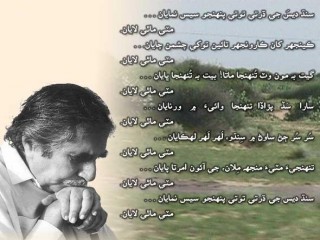
Shaikh Ayaz biography
Date of birth : 1923-03-23
Date of death : 1997-12-28
Birthplace : Mubarak Ali Shaikh
Nationality : Pakistani
Category : Arts and Entertainment
Last modified : 2010-04-08
Credited as : Sindhi poet, Chancellor of Sindh University,
1 votes so far
Shaikh Ayaz was one of the major Sindhi poets of Pakistan. By profession he was a lawyer but he also served as the vice chancellor of Sindh University. The people of Sindh province, in Pakistan, admire his poetry greatly. In Sindhi poetry he is considered like Pablo Neruda to the Latin America. His poetry brought new trends in Sindhi literature. His poetry has high aesthetic value.
The work of a great poet represents the coming together of different and discordant elements. Shaikh Ayaz too is such a poet. In one of his early poems he writes of the two deities from classical India: Saraswati, the goddess of knowledge and music sitting together with Kali, the wanton goddess of blood and violence, the two of them sipping nectar in a moon-lit temple. "How have the two come together?" the poem contemplates and then comes up with the answer: Perhaps a great poet has been born. Ayaz's poetry must have been born in such an instant since it represents the coming together of diverse elements --- beauty and the shadow of death. Shaikh Ayaz is one of the major voices in twentieth century poetry. His literary career spanned almost six decades and displayed an amazing variety in poetry and prose, ranging from the traditional bait, wa'i and ghazal to plays in verse, prose poems and even musings, and extending to short fiction, memoirs and journals, polemical and literary essays, newspaper articles, editorials, even a projected novel. To each genre he brought his unique vision and transforming power of language.
Shaikh Ayaz's work is spontaneous, objective and forceful. He defiantly wrote verses on every such topic which was hated by the establishment. He was incarcerated many times for his "seditious" writings and was also sentenced to death, but escaped gallows due to the sudden change of government.
He wrote short stories, novel, essays, poetry, travelogues, diaries, an autobiography and the translation of Shah jo Risalo in Urdu. He also composed poetry in Urdu and two of his anthologies, "Booye Gul, Nala-i-dil" and "Neel Kanth Aur Neem Ke Pate" were highly acclaimed. He portrayed the miseries of suffering humanity, the sorrows of the deprived and the wretched conditions of the exploited masses who had been suffering at the hands of an unjust system for centuries.
















